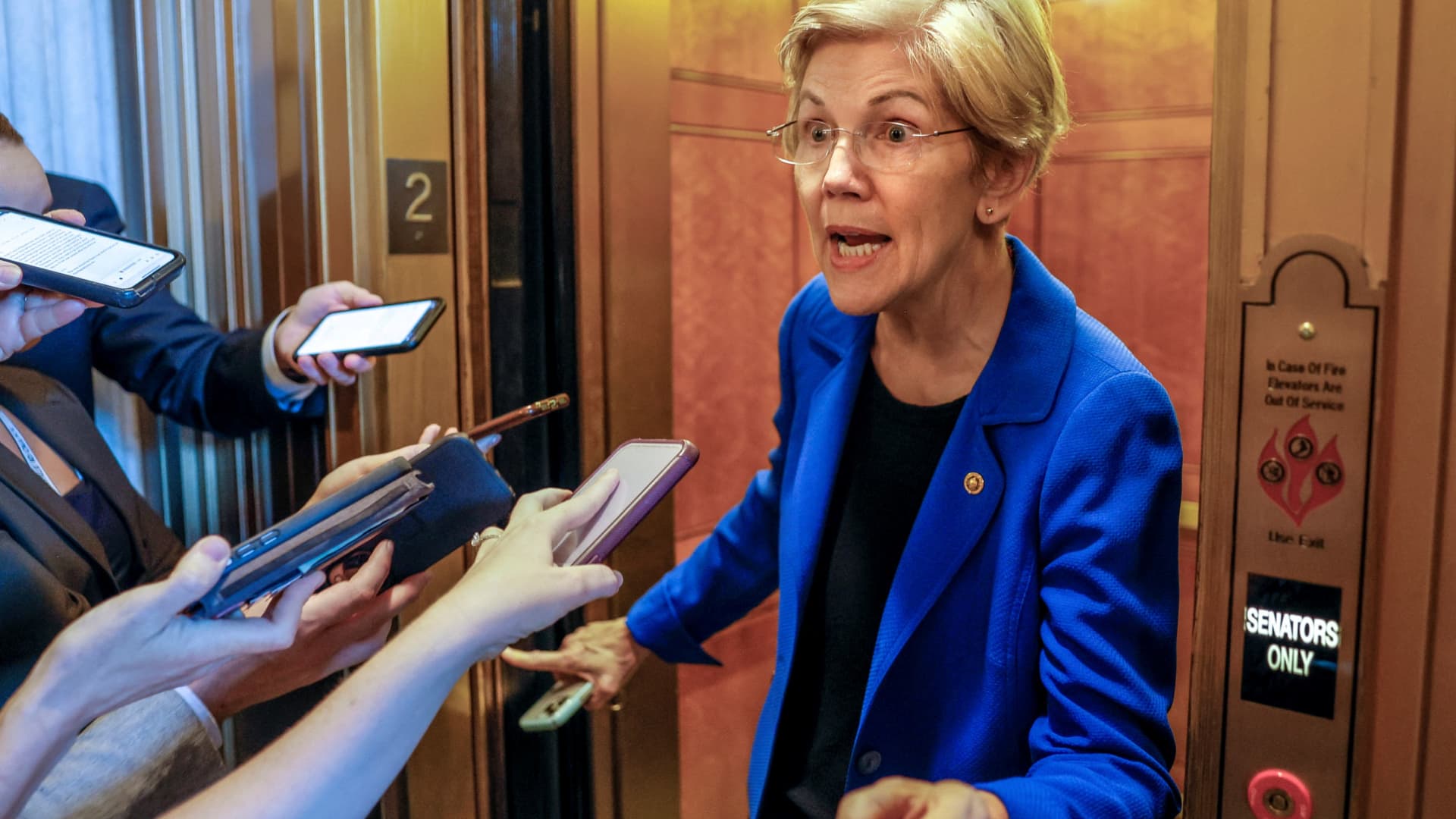U.S. Senator Elizabeth Warren (D-MA) speaks to reporters about codifying gay marriage on Capitol Hill in Washington, September 15, 2022.
Evelyn Hockstein | Reuters
WASHINGTON — A group of Democratic senators introduced new legislation Tuesday to repeal Trump-era bank deregulations they say created the conditions that allowed for the dramatic collapse of Silicon Valley Bank and the closure of Signature Bank since Friday.
The new bill lowers the threshold at which banks deemed “too big to fail” are subjected to enhanced federal supervision under the 2010 Dodd Frank Act.
Under Dodd-Frank, the tighter capital and liquidity requirements, known as “enhanced prudential standards” were applied to any bank with consolidated assets of $50 billion or more.
Right away, mid-sized banks, including SVB, began lobbying Congress for an exemption from the tighter oversight rule. In 2018, the lobbying paid off, when Republican majorities in the House and Senate voted to raise the bank asset threshold to $250 billion, and then-President Donald Trump signed it into law.
On the Senate floor Tuesday, Democratic Sen. Elizabeth Warren, Mass., drew a straight line from the 2018 deregulation effort to the 2023 failure of SVB and Signature.
“The weakened rules permitted banks like SVB and Signature to load up on risks, run up their profits, pay their executives, giant bonuses, and eventually blow the banks to pieces,” said Warren.
Silicon Valley Bank had roughly $209 billion in assets when the California Department of Financial Protection and Innovation shuttered it on Friday while Signature had $110.4 billion in assets when the New York Department of Financial Services took it over Sunday.
A longtime critic of the banking industry, Warren is one of the chief sponsors of the new legislation, which would lower the asset threshold for enhanced prudential measures back to its original $50 billion level.
A similar bill was introduced in the House by Rep. Katie Porter, a California Democrat and one of several members of the House vying for the seat of retiring Sen. Dianne Feinstein. Both bills have a number of Democratic co-sponsors, but a complete list was not available Tuesday evening.
“If Congress and the Federal Reserve had not rolled back key provisions of Dodd Frank, these banks would have been subject to stronger liquidity and capital requirements… and regulators standing at their shoulder, looking more closely at every part of the bank’s business,” said Warren. “But because those stringent requirements were taken out of Dodd Frank, when an old fashioned bank run hit SVB, the bank could not withstand the pressure,” she said.
As Congress begins to examine the overnight collapse of SVB and the actions taken by regulators to stem a broader banking crisis, fresh fault lines are emerging not only between Democrats and Republicans, but among individual members of each party.
In the Senate, there are 13 members of the current Democratic caucus who joined Republicans in 2018 to vote for the regulatory rollback of Dodd-Frank, including Virginia Sen. Mark Warner, who leads the Senate Intelligence Committee.
Warner has defended his 2018 vote in recent days, and his comments underscore the difficulty Warren is likely encounter in seeking to repeal the 2018 rules.
“I think it put in place an appropriate level of regulation on mid-sized banks,” Warner said last weekend of his 2018 vote. “These mid-sized banks needed some regulatory relief,” he told ABC News’ “This Week.”
While the repeal’s path forward in the Senate is tricky, its path in the Republican-controlled House is all but impassible.
House Speaker Kevin McCarthy, R-Calif., tweeted Tuesday that the real culprit for the SVB and Signature collapses was President Joe Biden’s economic agenda.
“Biden’s reckless spending caused record inflation and rapid interest rate hikes that broke family budgets and banks too,” wrote McCarthy, adding: “We must restore fiscal sanity.”

